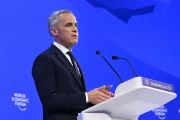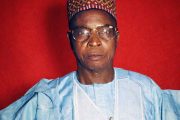In spite of the mindset of politicians, democracy has come to stay in Nigeria, says Prof Attahiru Jega under whose leadership the Independent National Electoral Commission, (INEC) pulled through the most scientifically credible election in Nigeria’s history so far. He told Africa Review Today, a journal with Africa bias published in the United States of America in an elaborate interview whose online version has just been released that there is a growing desire for improvements and that getting elections right is a good way of deepening democracy in the country.

Prof Jega
It is an interview which is bound to generate interest not only because it is coming from the horse’s mouth but because Jega has also cut the image of raising the stakes in excellence. His position on democracy coming to stay is thus a discourse with a constitutive impact. It is an interview that would also elicit interest beyond Africa because Africa is still the continent with the highest concentration of election creases in the democratisation process. The interview is paradoxically coming out in the week that Kenya, for example, is basically boiling. The interview would also be published verbatim as soon as allowance for that can be confirmed.
The interview which Intervention will take on in greater details later has six key themes covering the 2011 review of voters’ register, feasibility of reform, procurement, temporary staff and the future of democracy has Jega speaking longest on the future of democracy. Here, Prof Jega said that previously, the voting process was so fraudulent that people were losing hope. “They were asking, “What is the point when my vote does not count?” That attitude, he says, has begun to change since 2015 when an opposition candidate defeated the incumbent president at the ballot box. People are now increasingly aware of their ability to choose who to vote in and who to vote out, he maintained, pointing out that the mindset of politicians will be forced to shift as more and more come people come to appreciate this
In his view, many people did not have to canvass votes with new ideas and policies in the past beyond merely buying their seat, seeing it as an economic investment. That, he argues, is changing as there are increasingly those he described as some very good, diligent, resilient politicians speaking out in favour of systematic reform.
Rendering his voice in support of the thesis that Africa’s future lies in stronger institutions, Jega told his interviewers that strong institutions could minimise the impact of transgressions by individuals. Illustrating with INEC, he adds how they have built it an institution that can function fully and effectively regardless of who is in charge, an assertion that many would be watching its reification in subsequent performance of INEC far beyond the incumbent. But Jega says a lot of progress has been made although he concedes the need for consolidation of such, citing the issue of campaign finance as an example of such.
Rendering his voice in support of the thesis that Africa’s future lies in stronger institutions, Jega told his interviewers that strong institutions could minimise the impact of transgressions by individuals. Illustrating with INEC, he adds how they have built it an institution that can function fully and effectively regardless of who is in charge, an assertion that many would be watching its reification in subsequent performance of INEC far beyond the incumbent. But Jega says a lot of progress has been made although he concedes the need for consolidation of such, citing the issue of campaign finance as an example of such.
His other example is where although a political party monitoring unit was established in 2012, there is case for greater legal clarity about when campaigns start, and hence when donations count, and on punishment for overspend transgressions. “A lot more could be done to name and shame individuals. If the public is made aware that a candidate has spent over the legal allowance before the campaign is complete, open and inclusive discussions about what should be done can take place”




























